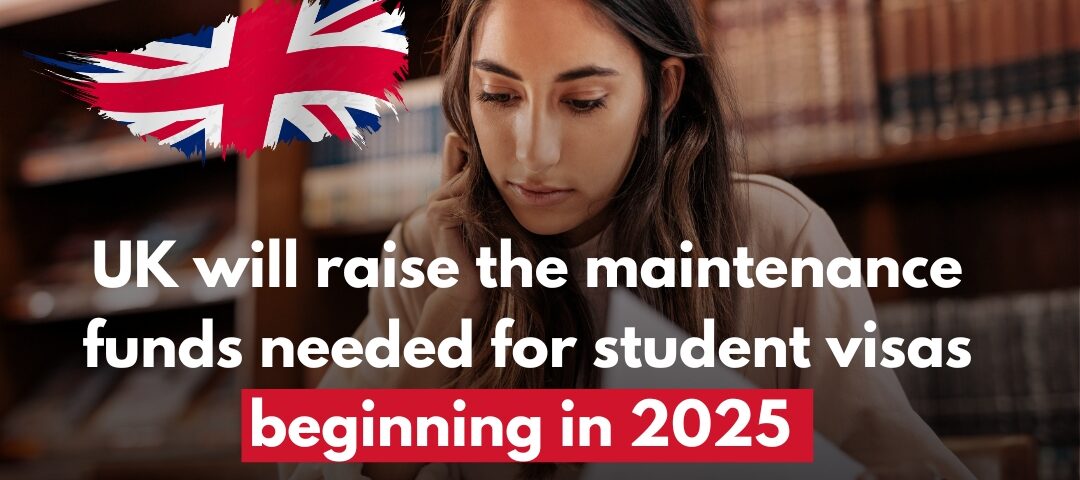
Important PTE Speaking module tips: Part 2
30 November 2024
Top destinations to study abroad in 2025
3 December 2024UK will raise the maintenance funds needed for student visas beginning in 2025.*
UK has long been preferred by Indian students seeking a top-notch education, exposure to other countries, and a pleasant cultural experience. But beginning in January 2025, the British government intends to raise the minimal maintenance expenses that applicants for student visas must pay.
Although this change, which was announced on September 10, 2024, shows that the UK is committed to keeping up with inflation and growing living expenses, it may make it more difficult for students to organize their finances, especially those from India, which is one of the major student populations in the UK.
What is the UK’s Maintenance Fund Requirement Changing?
It has always been essential for students who want to study in the UK to have sufficient funds in their bank account in order to obtain a student visa.
The funds are intended to cover the student’s living expenses during their course of study. Currently, applicants must demonstrate that they have a specific sum available for 28 days prior to applying for a visa. The amount allotted depends on whether the student will be studying in London or another part of the city.
In order to cover living expenses, students studying outside of London must currently demonstrate that they earn £1,023 per month, while those studying in London must demonstrate that they earn at least £1,334 per month. Beginning in January 2025, these financial commitments will increase. London-based students will now pay £1,483 a month, an increase of 11.2%. Students studying outside of London now require £1,136 per month, an increase of 11.1%. These changes reflect rising living costs in the UK and are consistent with inflation and increases in domestic student maintenance loans.
What Effects Will These Modifications Have on Indian Students?
This increase in tuition fees would undoubtedly have an effect on Indian students, who are famed for their tenacity in pursuing higher education overseas. However, the effects may not be as severe for many as they seem at first.
Indian students usually spend over Rs 20 lakh (about £20,000) annually on tuition, living expenses, and housing when studying abroad. Despite being higher, the additional financial requirements are not expected to represent a significant obstacle in this specific case.
Consider a scenario in which a student plans to attend a London institution and pay £20,000 in tuition. The student would need to prove that they have £13,347, or £1,483 a month, for nine months under the new rules. The student would need to demonstrate that they have £33,347 in their bank account in addition to the tuition. For a university outside of London that charged the same tuition, the student would also need to show proof of £1,136 per month for nine months, which would equal £10,224, plus the remaining £30,224.
The process remains unchanged: the funds must remain in the bank account for a full 28 days prior to submitting an application for a visa. If the student has already received a scholarship or has paid some of their tuition, the entire amount might be waived. However, due to the increase, families will need to ensure that they have these larger sums available well in advance of submitting a visa application.
Would Some Indian Students Be Affected by This?
The increase in needed maintenance payments will not sit well with many students, especially those from lower-income families. Even though the increase is modest in comparison to the overall cost of studying, families that are already struggling financially to pay for an abroad education may feel extra strain.
However, it’s important to realize that most Indian students take into account factors other than cost when deciding where to study. Important factors still include the institution’s standing, post-graduation work opportunities, and the UK’s relatively high visa acceptance rates. It is unlikely that the more stringent financial requirements will supersede these more crucial factors for the vast majority of Indian applicants.
This new rule, however, might compel students who are already struggling financially to seek out more money through loans, financial aid, or scholarships. Students and their families should start preparing early and utilize all available resources to ensure they can meet these requirements without excessive stress.
It is advisable to:
Make Early Plans: Since the rule will go into effect in January of 2025, students who intend to study in the UK should start preparing their finances well in advance. Making ensuring the necessary funds are in place before the 28-day window for visa applications will help you avoid financial strain at the last minute.
Analyze Financial Aid and Scholarships: Indian students are often eligible for scholarships from UK colleges and Indian government initiatives. By applying for these, the amount of money that must be displayed in the bank account can be reduced.
Look for On-Campus Jobs : Many international students studying in the UK are allowed to work part-time. This can relieve some of the financial strain and assist augment living expenses.
Seek Professional Advice: To help students and their families make the right plans, financial advisors, university counselors, and educational consultants can give them accurate information regarding requirements.
Given the growing expense of living in the UK, the increase in maintenance costs may seem like just one more barrier, but it is actually a necessary adjustment. Most Indian students will see the higher financial requirements as a reflection of the actual expense of studying overseas rather than as an impassable barrier. With sufficient planning and financial management, most Indian applicants ought to be able to adhere to the new rules.
Since the UK continues to be a popular choice for Indian students due to its excellent education and wide range of post-study prospects, this financial adjustment will most likely be accepted as part of the total cost of earning a degree in one of the most renowned educational centers in the world.


